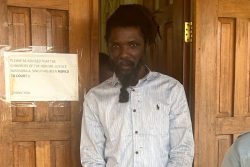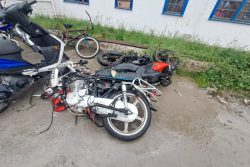The Guyana Revenue Authority (GRA) is moving to improve its database management software system in order to improve its efficiency, according to Commissioner-General Godfrey Statia, who on Monday reported that it would be only a matter of time before the agency moves from the Total Revenue Integrated Processing Systems (TRIPS).
While the GRA’s accounts faced scrutiny during a Public Accounts Committee (PAC) hearing on Monday, there were several instances where Statia objected to the figures presented in the 2015 Auditor General (AG) report due to what he explained were inefficiencies in the data management system, TRIPS.
The committee was going on the AG’s report that 1,509 of 3,494 taxpayers who were registered for Value-Added Tax (VAT) had failed to file their returns, with 991 of that number having made no submissions and only partial submissions made by the remaining 518.
Statia disputed this, however, and Ron Simboo, Deputy Commissioner, Inland Revenue, related that the number was in fact 766 and not 1,509 and that the latter actually included persons who were deregistered and who faced deregistration.
Following a query from MP Nigel Dharamlall, Statia related that the large number of persons that needed to be deregistered was owing to several reasons, including the fact that some may have been incorrectly registered, some fell under the threshold for VAT payment, or were exempt companies.
Asked then, whether the AG’s figures had been correct at the time they were published, Statia disagreed.
“I daresay that I would not like to agree with that sir and the reason is because of the TRIPS system that has been operating or that has not been operating since its inception in 2007. The TRIPS system is riddled with errors and if you pull the reports from the TRIPS system you will see lots of errors there. So they needed to be some sort of reconciliation with what has been transpiring in the TRIPS system and what has been done manually,” he said.
He further stated that the system would “continue to be riddled with errors” until they fixed it.
“And we know that it’s only a question of time before we move from TRIPS to one of those better softwares and the reason is that we have already expended over $4.6 billion on TRIPS II…and we have had nothing to show at all and that is why we need to salvage some part of it until we can find alternative means….we are just trying to salvage a software that we know in 2 or three years’ time that we’ll have to change,” Statia said. He added that they would be examining sourcing engineers from India for coding, as this was an issue.
Statia stated that instructions were passed to the Crown Agents to cease all work related to Customs as they would be moving to the ASYCUDA system.
“…What I found is that the Crown Agents, they were looking at TRIPS in an all-encompassing way and I told them it should not be done like that. We wanted it to be turned up as per modules. Because if they had turned up each particular module at least VAT would have been working well, customs may have been working well and certain parts of internal revenue would have been working well,” he said.
The AG’s 2015 report states that while TRIPS is the GRA’s core system, there are other applications that use information from it and transfer information to it. It also stated that the GRA, at the time of reporting in 2016, was considering reintroducing ASYCUDA, a customs management system, to improve Customs operations and “upgrading TRIPS with the modification that it focuses only on taxation.” It said that the TRIPS II project was expected to address the majority of existing issues now being faced and introducing new features with the aim of improving tax operations.
Statia said that the cost for the implementation of ASYCUDA was initially given as US $1.5 million but it was revised to US$2.1 million. Additionally, the pilot study should be in place at least by September or by the end of the year, with the full turn up by 2018 the latest, according to the contractual agreement.








